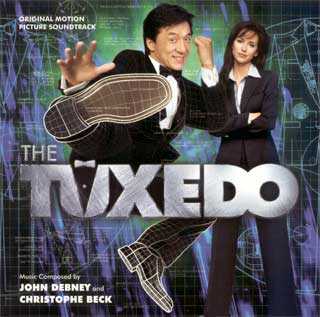With the release of xXx and Die Another Day, it comes as no surprise that Hollywood, still reeling from the effects of the most recent Writers’ Guild strike, should turn to the world of international espionage to draw box office ticket sales. In doing so, they have produced two largely unsuccessful comedies – one intentional, the other not – featuring respectable performers keenly supported, but not rescued by, a selection of well-known West Coast composers. One is Ballistic: Ecks vs. Sever, music composed by Don Davis, and the other:
The Tuxedo
Music composed by John Debney and Christophe Beck
Orchestrations by Brad Dechter, Frank Bennett (for John Debney); Kevin Kleisch, Bill Boston, Rossano Galante, and Pete Anthony (for Christophe Beck).
Available on Varèse Sarabande Records (VSD-6414)
Running Time: 36:52
Crotchet Amazon UK Amazon US

Despite its lightweight subject matter (A chauffeur unwittingly dons a tuxedo from his boss's wardrobe finding that it gives him special powers, thrusting him into the closeted world of international espionage as a result.) and subsequent lukewarm critical reaction, composers John Debney and Christophe Beck have crafted a score that's both immensely fun and perfectly suited, if you pardon the weak pun, to this Jackie Chan comedy.
John Debney's contribution to the score further demonstrates his adeptness with texture programming and drum looping, one that has been infused in many of his scores of recent years, most notably in the superb Jimmy Neutron – Boy Genius. Indeed, this score recalls many elements of Jimmy Neutron in cues such as "Skateboard Chase" and "Demolition program" with their pulsating techno rhythms, frenetic guitar figurations, and highly-syncopated brass punctuations. Those elements aside, finale cues such as "Banning Opens the Pods" and "Banning Swallows Queen" demonstrate a greater refinement of his technique, a successful marriage of jazz-leanings and anarchic Hollywood mickey-mousing. For John Debney, then, this scoreprovides the listening public with an admirable demonstration of how an established composer can take on the new generation of electronica-honed youngsters and deliver a salubrious, enjoyable end-result.
Christophe Beck, whose efforts have been heard more recently in films such Slap Her… She's French and the direct-to-video thriller sequel The Skulls II, provides eight of the nineteen cues on the album (John Debney provides the rest, with the exception of the mandatory song cut – James Brown performing his cult hit "Get Up"), all of which express great flair and musical deftness. From the outset, with his infectious "Main Title" and "First Mission", Beck viscerally captures the surroundings of Jimmy (Jackie Chan) Tong's world with a solid harmonic grounding, ably supported by intense drum loops and a marvellous feeling of space between instrumental pairings. Building upon John Debney's witty spy theme, an embellished blues motif for electric guitar (first heard in the disc's opening cue, "Jimmy's Tux"), Beck inverts its usage in "Superhuman" and permeates his underscore with a plethora of interesting contrapuntal ideas, notable in the scratch-heavy highlight "Demolition" and the icy-cool "Water Strider".
The album is a pleasure to listen to, though certainly not one that will appeal to all tastes. Indeed, slight comparison can be drawn between this and David Arnold's recent super-slick contribution to the Bond phenomenon, Die Another Day, when suggesting an audience for such an album. The Tuxedo is a soundtrack which lucidly evokes the supposedly-entertaining nature of the film, one that has yet to arrive on British shores, and benefits from the coupling of two adroit composers.
Glen Aitken
3
Return to Index